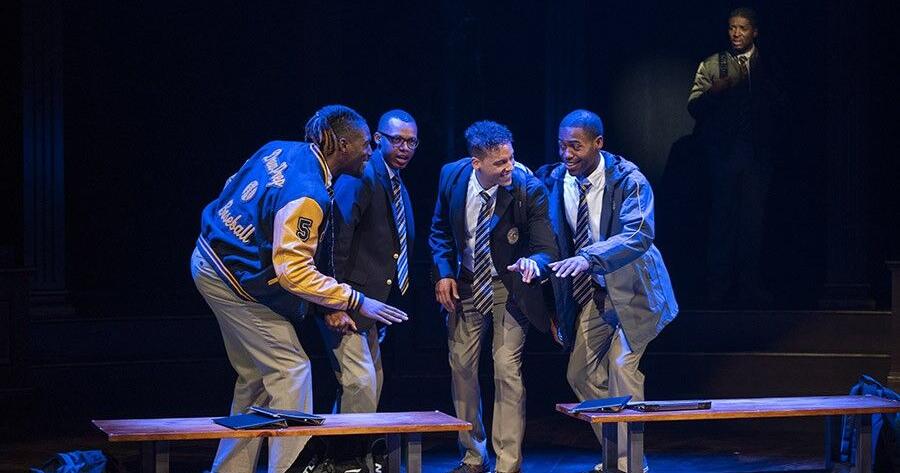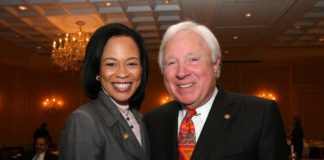
Editor’s note: This review was based on the opening night performance. Jos N. Banks has since taken over the role of Pharus.
Stripped to a one-sentence synopsis, Steppenwolf ensemble member Tarell Alvin McCraney’s 2012 “Choir Boy” is a coming-of-age story about a gay Black teenager navigating the troubled waters of his senior year in high school. But what elevates this 95-minute play by the 2016 Academy Award winner (with Barry Jenkins) for the screenplay of “Moonlight” is the music.
In Steppenwolf’s new production, directed by Kent Gash, hymns and spirituals (and a Boyz II Men/New Edition mashup) are artfully woven into the action by musical director Jermaine Hill. Highlights include “ Motherless Child,” “Keep Your Eyes on the Prize (Hold On),” “Ring Dem Bells” and “What Wondrous Love is This.” Several of the songs feature Bryon Easley’s powerful choreography, which peaks with amazing step-dancing that’s simultaneously contemporary and timeless.
Besides enlivening the show, the prominence of the songs makes perfect sense because the focus for the students we see at the elite (fictional) Charles R. Drew Prep School for Boys is the choir. The play starts with Pharus (Tyler Hardwick), a junior at the all African American college prep academy with a Christian bent, singing the school song, “Trust and Obey,” at commencement exercises for the 49th graduating class, and it ends—a bit abruptly—with his act of defiance at the 50th anniversary ceremony.
Problems for Pharus actually surface at the first commencement. Hearing a fellow student hiss out a homophobic slur, he pauses for a moment before deciding to soldier on beautifully with the song. An angry Headmaster Marrow (La Shawn Banks) calls the boy into his office to admonish him for threatening the school’s reputation and his own, cautioning him not to be too flamboyantly gay (though Banks himself gestures extravagantly). Marrow also wants to know who was responsible for the slur, but Pharus refuses to say, citing the school’s honor code, even though his coveted position as choir leader for the coming year is at risk.
Marrow does elicit enough information to implicate Bobby (Gilbert Domally), who happens to be his nephew, and punishes him and sidekick Junior (Samuel B. Jackson) with garbage duty. Pharus, who remains choir leader, gets back at Bobby by kicking him out of the choir, but some wrongfully think Pharus turned Bobby in.
The antipathy between the outspoken, openly gay but increasingly insecure Pharus and bullying Bobby escalates, with none-too-sharp Junior occasionally trying to mediate, and two other students entering the fray. David (Richard David), who is on a scholarship and wants to become a minister, has relevant issues of his own we later learn. AJ (Sheldon D. Brown), Pharus’ jock roommate, is about the only one who doesn’t reject him and epitomizes compassionate friendship in the evening’s most moving moments.
While the play has some haunting interludes illuminating the boys’ vulnerability, among them a shower scene on Arnel Sancianoco’s oval rotunda-like set with dramatic lighting by Jason Lynch, and a series of one-sided phone calls home revealing the boys’ individual struggles, there also are a number of subplots that don’t fit together into a coherent narrative.
For example, the Headmaster hires the previously retired Mr. Pendleton (William Dick), the only white character, to teach a course on “creative thinking”–and improbably to supervise the choir (even though he can’t sing)–for no apparent reason. Although Mr. Pendleton’s racially insensitive remarks elicit gasps from the audience despite his work for the civil rights movement, the main reason for his presence seems to be the heated argument that erupts in his classroom about the nature and purpose of spirituals. Pharus asserts that the music was an end in itself that provided solace and hope for the enslaved—and continues to inspire today. Bobby vehemently disagrees and, like many, holds that songs such as “Swing Low, Sweet Chariot” contained coded messages to help guide slaves to freedom. Then the matter is dropped without a resolution.
I suspect that changes over time in the script to keep it in sync with current thinking about social issues haven’t all been for the better, but “Choir Boy” remains a potent look at the pitfalls of becoming a gay Black man. And the music, for which credit also goes to sound designer Pornchanok Kanchanabanca, helps tie everything together and makes this a “must see.”








